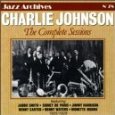
Daily Dose Of Jazz…
Charlie “Fess” Johnson was born on November 21, 1891 in Philadelphia, Pennsylvania. He led an ensemble called the Paradise Ten and played in Harlem clubs like Small’s Paradise between 1925 and 1935.
Though Charlie was an accomplished pianist very rarely did he eve solo on his recording sessions and as a unit never achieved the reputation is so deserved. It was noted later that the band rivaled Duke Ellington and anyone else and employed a number of notables like Sidney DeParis, Charlie Irvis, Dicky Wells, Benny Waters and Benny Carter, who also wrote arrangements for the band.
He led the ensemble until 1938 then his musical endeavors freelancing in various ensembles around New York City until he retired in the 1950s due to health issues. Pianist and bandleader Charlie Johnson, who nickname “Fess” it is assumed was shortened from Professor, passed away in Harlem Hospital on December 13, 1959 in New York City.
More Posts: piano
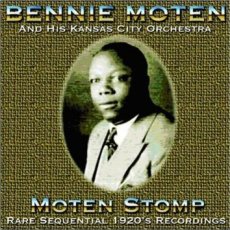
Daily Dose Of Jazz…
Bennie Moten was born on November 13, 1894 in Kansas City, Missouri. By the time he reached his mid-twenties he was leading the Kansas City Orchestra that was the most important of the itinerant, blues-based orchestras active in the Midwest at the time. The band helped develop the riffing style that would come to define many of the 1930s Big Bands.
Moten first recorded with Okeh Records in 1923 influenced by New Orleans and ragtime. His Victor Records sessions had a more sophisticated sound similar to Fletcher Henderson but featured a hard stomp popular to Kansas City.
By 1928 Bennie’s piano was showing some Boogie Woogie influences, but the real revolution came in 1929 when he recruited Count Basie, Walter Page and Oran “Hot Lips” Page. Walter Page’s walking bass lines gave the music an entirely new feel compared to the 2/4 tuba, colored by Basie’s understated, syncopated piano fills.
Their final session comprised of 10 recordings made in 1932 were made during a time when the band was suffering significant financial hardship but had added Ben Webster and Jimmy Rushing as their primary vocalist. These recordings showed the early stages of what became known as the “Basie Sound” some four years before Basie would record under his own name.
Pianist and bandleader Bennie Moten passed away after an unsuccessful tonsillectomy on April 2, 1935.
More Posts: piano
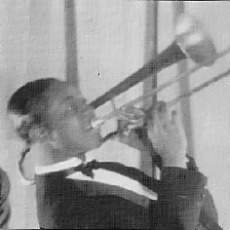
Daily Dose Of Jazz…
Jimmy Harrison was born on October 17, 1900 in Louisville, Kentucky and began on trombone at age 15, playing locally in the Toledo, Ohio area. He also played semi-pro baseball but chose music over a career in sports when he joined a traveling minstrel show in the late 1910s.
By 1919 Harrison was leading his own jazz ensemble in Atlantic City, New Jersey and played in the bands of Charlie Johnson and Sam Wooding. Moving to Detroit he played with Hank Duncan and Roland Smith. After returning to Toledo, he played gigs with June Clark and James P. Johnson. He followed this period with a stint in New York City with Fess Williams.
Giving leadership of his ensemble to June Clark in 1924, Jimmy continued to play with the group, worked with Duke Ellington during this period and in 1925 was working with Billy Fowler then with Elmer Snowden, Fletcher Henderson and Benny Carter’s Chocolate Dandies. While on tour with Henderson he took ill with a stomach ailment and though he continued to play for several months with Chick Webb. Trombonist Jimmy Harrison passed away on July 23, 1931 in New York City at the age of 30.
More Posts: trombone
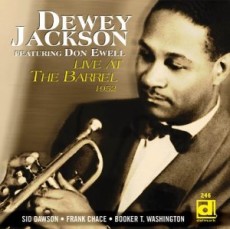
Daily Dose Of Jazz…
Dewey Jackson was born on June 21, 1900. A trumpeter and cornetist, he began playing professionally at an early age, with the Odd Fellows Boys’ Band in 1912, then Tommy Evans from 1916-17 and George Reynold’s Keystone Band.
He played the riverboats with Charlie Creath and then led his own Golden Melody Band from 1920 to 1923. He continued to be a regular performer on riverboats into the early 1940s, heading his own groups and working as a sideman for Creath and Fate Marable. His only major stint off boats during this time was in 1926, when he played for four months with Andrew Preer at the Cotton Club in New York City.
Jackson played little in the 1940s but returned to work in the 1950s with Singleton Palmer and Don Ewell. He recorded only four sides as a leader in 1926. Among his sidemen were Pops Foster, Willie Humphrey, Don Stovall, Morris White and Clark Terry.
Dewey Jackson passed away on January 1, 1994.
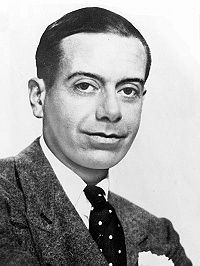
Daily Dose Of Jazz…
Cole Albert Porter was born into wealth on June 9, 1891 in Peru, Indiana. His musical training began at an early age, learning the violin at age six, the piano at eight and wrote his first operetta, with help from his mother at 10. His father, an amateur poet, may have influenced his son’s gifts for rhyme and meter. He matriculated through Yale writing student songs went on to Harvard law, switched to the music faculty, where he studied harmony and counterpoint.
Classically trained, he was drawn towards musical theatre. After a slow start, he began to achieve success in the 1920s, and by the 1930s he was one of the major songwriters for the Broadway musical stage. Unlike most successful Broadway composers, Porter wrote both the lyrics and the music for his songs.
After a serious horseback riding accident in 1937, Cole was left disabled and in constant pain, but he continued to work. His shows of the early 1940s did not contain the lasting hits of his best work of the 1920s and 30s, but in 1947 he made a triumphant comeback with his most successful musical, Kiss Me Kate.
Porter wrote numerous songs that have come to be jazz standards such as Night and Day, Anything Goes, I Get A Kick Out Of You and I’ve Got You Under My Skin, It’s De-Lovely, Begin the Beguine, Just One of Those Things and In The Still of the Night. He also composed scores for films from the 1930s to the 1950s.
Cole Porter, composer and lyricist, noted for his sophisticated, suggestive lyrics, clever rhymes and complex forms, contributed to the great American songbook, passed away of kidney failure on October 15, 1964.
More Posts: composer,songwriter


